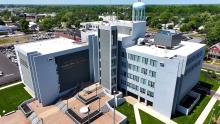By
on
I am not going to spend a lot of time on this, because if it isn't in the proverbial weeds for the focus of this site, it is pretty close. But the merger between Comcast and NBC would be bad news for publicly owned networks.
Comcast is already a massive company that has huge advantages due to its scale. When a community served by Comcast decides it wants a network that puts the community first rather than the boardroom in Philadelphia, they have to compete with Comcast for customers. Comcast can cross-subsidize from its non-competitive markets, meaning it can offer its services at a loss in competitive communities, offering prices that a new network simply cannot beat while paying its bills.
The larger it gets and the more channels it owns, the more market power it has and the harder for competitors to get enough subscribers to stay in business.
Beyond publicly owned networks, the Comcast and NBC merger is bad for everyone who likes real choices in channels to watch and programming to consume. In these times of great creativity due to the openness of the web, it further constrains opportunities for independent content creators - as illustrated by two articles describing the sausage-making of creating a channel lineup: Comcast vs. the Tennis Channel and How Cable Programming is 'Chosen.'







